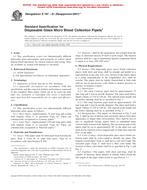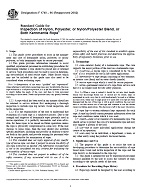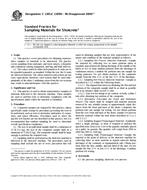1.1 This specification covers four grades of fuel oil made of at least 25 % used lubricating oils. The four grades of fuel are intended for use in various types of fuel-oil-burning industrial equipment and commercial boilers under various climatic and operating conditions. These fuels are not intended for use in residential heaters.
1.1.1 Grades RFC4, RFC5L, RFC5H and RFC6 are used lubricating oil blends of increasing viscosity, with or without middle distillate or residual fuel oil, or both, that are intended for use in industrial burners and commercial boilers equipped to handle these types of fuels. This specification is for applications where Specification D 6448 would not meet the performance or other requirements of the burner or boiler in question.
Note 1 – For information on the significance of the terminology and test methods used in this specification, see Appendix X1.
1.2 This specification is for use in contracts for the purchase of fuel oils derived from used lubricating oil and for the guidance of consumers of such fuels. This specification does not address the frequency with which any particular test must be run.
1.3 Nothing in this specification shall preclude observance of national or local regulations which can be more restrictive. In some jurisdictions, used oil is considered a hazardous waste and fuels derived from used oil are required to meet certain criteria before use as a fuel.
Note 2 – For United States federal requirements imposed on used oil generators, transporters and transfer facilities, reprocessors, marketers, and burners, see 40 CFR Part 279.
Note 3 – The generation and dissipation of static electricity can create problems in the handling of distillate burner fuel oils. For more information on the subject, see Guide D 4865.
1.4 The values stated in SI units are to be regarded as standard. No other units of measurement are included in this standard.
1.4.1 Exception – Table 1 and Table X1.1 include inch-pound values in parentheses for information only.
TABLE 1 Detailed Requirements for Non-Industrial Burner Fuels from Used Lubricating Oils
| Properties | Test MethodA | LimitsB | |||
|---|---|---|---|---|---|
| RFC4 | RFC5L | RFC5H | RFC6 | ||
| Physical | |||||
| Viscosity at 100°C mm²/sC | D 445 | ||||
| min | . . . | . . . | 5.0 | 9.0 | 15.0 |
| max | . . . | <5.0 | 8.9 | 14.9 | 50.0 |
| Flash point, °C (°F), min | D 93, Procedure B | 38 (100) | 55 (130) | 55 (130) | 60 (140) |
| Water and sediment,D % volume max | D 1796 | 1.0 | 1.0 | 2.0 | 2.0 |
| Pour point, °C (°F), max | D 97 | -6 (21) | E | E | E |
| Density, kg/m³ at 15°CF | D 1298 | Report | Report | Report | Report |
| Chemical | |||||
| Acid no., mg KOH/g, max | D 664 | 0.15 | 0.15 | 0.30 | 0.30 |
| Ash, % mass, maxG | D 482 | 0.2 | 0.3 | 0.3 | Report |
| Sulfur, % massH | D 129 | Report | Report | Report | Report |
| Performance | |||||
| Gross heating value, MJ/kg (BTU/gal),I min | D 240 | 40.0 (130 000) | 41.5 (135 000) | 41.5 (135 000) | 43.0 (140 000) |
| ContaminantsJ | |||||
| Arsenic, ppm, max. | K | 5 | |||
| Cadmium, ppm, max | K | 2 | |||
| Chromium, ppm, max | D 5185K | 10 | |||
| Lead, ppm, max | D 5185K | 100 | |||
| Total halogens, ppm, max | D 5384K | 1000 | |||
| PCBs, ppm, max | D 6160 | 50L | |||
A See Section 8 for details and additional test methods.
B Units given in parentheses are for informational purposes only.
C 1 cSt = 1 mm²/s.
D Solids content shall not exceed 0.5 %. Filtration may be required to obtain appropriate particle size for use. A deduction in quantity shall be made for all water and sediment in excess of 1.0 mass % for Grades RFC5H and RFC6.
E Buyer and seller to agree.
F Density in kg/L at 15°C multiplied by 1000 = kg/m³.
G Buyer and seller may agree on a higher ash content.
H Local jurisdictions may limit the sulfur content in burner fuels.
I Assumes 7.5 lb/US gal.
J These are US EPA current limits (40 CFR Part 279 and 40 CFR Part 761). If state or local requirements for used oil are more stringent, the burner fuel offered shall comply with the more stringent requirements.
K US EPA SW-846 6010. Where Test Method D 5185 is listed, Test Method D 5185 will be the referee test method.
L In the United States, current unrestricted use IAW 40 CFR Part 279 is <2 ppm. PCBs are permitted in qualified incinerators as defined in 40 CFR Part 761. US EPA prohibits blending down oils of >50 ppm to <50 ppm and oils <50 ppm to less than 2 ppm.
Product Details
- Published:
- 10/01/2008
- Number of Pages:
- 7
- File Size:
- 1 file , 130 KB
- Redline File Size:
- 2 files , 220 KB


